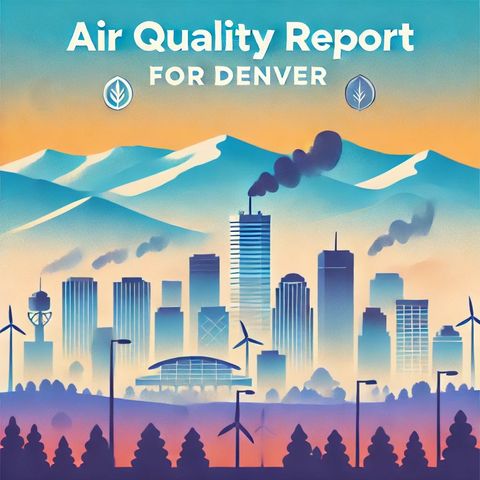Denver's Air Quality Moderate Amid Concerns

Sign up for free
Listen to this episode and many more. Enjoy the best podcasts on Spreaker!
Download and listen anywhere
Download your favorite episodes and enjoy them, wherever you are! Sign up or log in now to access offline listening.
Description
Today's air quality in Denver is a topic of considerable interest and concern. As of the latest updates, the Air Quality Index, commonly known as AQI, for Denver has shown...
show moreThe AQI scale ranges from 0 to 500, where lower values represent good air quality and higher values indicate worse air quality. For Denver today, the AQI has been hovering around the mid-50s to low 60s, which places it in the “Moderate” category. This range signifies that air quality is acceptable; however, there may be some pollution that poses a slight health concern for a very small number of people who are unusually sensitive to air pollution.
Several factors contribute to Denver’s air quality index. Particulate matter, specifically PM2.5 and PM10, are significant contributors. PM2.5 particles are extremely small, with diameters that are 2.5 micrometers and smaller, and they can penetrate deeply into the respiratory tract, reaching the lungs. On the other hand, PM10 particles are slightly larger but still can cause respiratory issues when inhaled. Today, the levels of PM2.5 in Denver are slightly elevated but not alarmingly high.
Ozone is another critical factor that influences the daily air quality. Ground-level ozone forms when pollutants emitted by cars, power plants, and other sources react in the presence of sunlight. In Denver, ozone levels often rise during the warmer months. Fortunately, today’s ozone levels are within acceptable limits but could climb higher if sunny and warmer conditions persist.
Weather patterns play a significant role in the air quality of an area. Denver’s unique topography, with its proximity to the Rocky Mountains, can sometimes trap pollutants in the region, creating what is known as an “inversion.” An inversion occurs when a layer of warmer air sits above cooler air at the surface, effectively trapping pollutants and preventing them from dispersing. Today, meteorological conditions are relatively stable, so no significant inversion events are anticipated.
Wildfires, both local and from neighboring states, can also impact Denver’s air quality. The particulate matter from wildfire smoke can travel vast distances and contribute to elevated AQI levels. Currently, there are no significant wildfire events affecting Denver’s air.
Environmental and public health agencies recommend that individuals who may be unusually sensitive to air pollution limit prolonged outdoor exertion during moderate AQI days. This precaution includes children, the elderly, and those with preexisting health conditions such as asthma or heart disease.
In summary, while Denver’s air quality today is moderate, residents and visitors should be aware of the potential implications, especially if they belong to sensitive groups. Monitoring local air quality reports and taking appropriate measures can help mitigate any adverse health effects associated with air pollution. As always, staying informed and prepared makes all the difference in maintaining good health and well-being.
Information
| Author | QP-5 |
| Organization | William Corbin |
| Website | - |
| Tags |
Copyright 2024 - Spreaker Inc. an iHeartMedia Company
